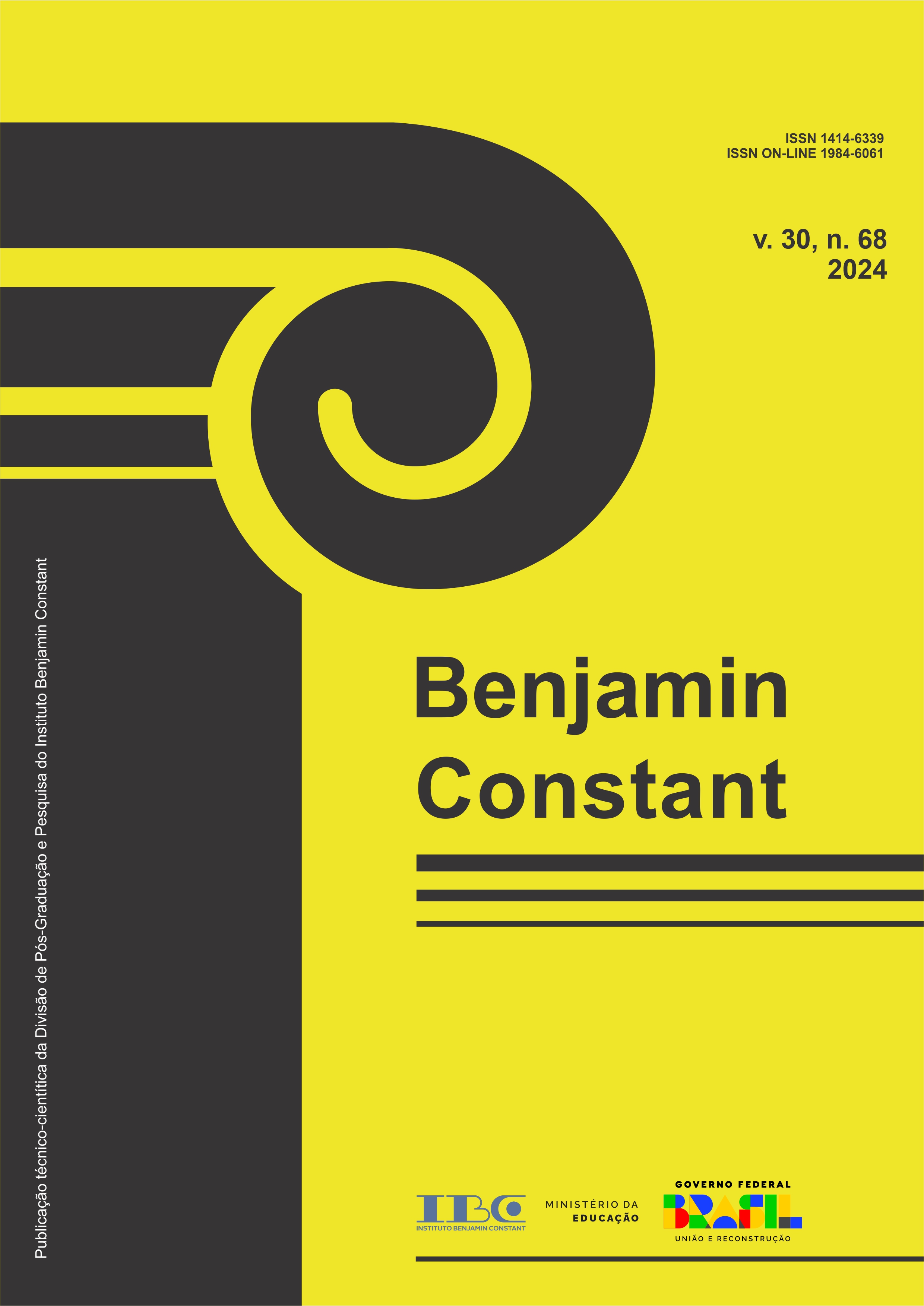Promoting socialization and inclusion of a blind student through an adapted braille card game: a Review of Powers and Roots
Abstract
This work aims to present reflections in the context of inclusive education involving a blind student and her process of socialization and improvement of her mathematical knowledge through the development of a game called Pife adapted into Braille. The purpose of developing the game was to provide opportunities for the inclusion of blind students and to improve their learning of mathematical content. The game was developed in the context of a municipal public school in the city of Pelotas located in the south of the state of Rio Grande do Sul (RS), currently known as the largest municipal school in Latin America. The game development process involved an analysis of the specific needs of the blind student and the adaptation of the Pife game rules and materials to make it accessible through the use of Braille. This included using the Braille code on the cards and adapting the moves to ensure that the student could participate independently in the activity. The research was carried out by collecting data from a questionnaire containing five questions and carried out with 20 students in the 9th year of Elementary School. The questionnaire was administered after the game was developed. The questions were designed with the aim of observing students’ perception of the effectiveness of the game in promoting inclusion and socialization among students and in learning mathematical content. The results obtained from the analysis of student responses show that games are an important tool for the socialization process, learning mathematical content and inclusion of blind students in Mathematics classes, promoting a more collaborative environment and making classes more dynamic and participatory.
References
ARAGÃO, Antônio Carlos Luiz. Além da sala de aula: parcerias entre professor, família e escola na Educação Inclusiva. Rebena - Revista Brasileira de Ensino e Aprendizagem, [Rio Largo, Alagoas], v. 7, p. 218-232, 2023.
BOALER, Jo. O que a matemática tem a ver com isso? Como professores e pais podem transformar a aprendizagem da Matemática e inspirar sucesso. Porto Alegre: Penso, 2019.
BRASIL. Decreto no 5.296, de 2 de dezembro de 2004. Regulamenta as Leis no 10.048, de 8 de novembro de 2000, que dá prioridade de atendimento às pessoas que especifica, e 10.098, de 19 de dezembro de 2000, que estabelece normas gerais e critérios básicos para a promoção da acessibilidade das pessoas portadoras de deficiência ou com mobilidade reduzida, e dá outras providências. Diário Oficial da União: seção 1, Brasília, ano 141, n. 232, p. 5-10, 03 dez. 2004.
DE OLIVEIRA, Maria do Socorro Fortes. A orientação e mobilidade para cegos deficientes múltiplos: uma proposta pedagógica a partir de jogos e histórias. Benjamin Constant, Rio de Janeiro, n. 56, p. 1-12, mar. 2017. Disponível em: http://revista.ibc.gov.br/index.php/BC/article/view/372/85. Acesso em: 12 out. 2023.
DE SÁ, Elizabet Dias; DE CAMPOS, Izilda Maria; SILVA, Myriam Beatriz Campolina. Atendimento educacional especializado: deficiência visual. Brasília: MEC: SEED: SEESP, 2007.
DUTRA, Flávia Barbosa da Silva et al. Adaptações de Jogos Matemáticos no Ensino Superior para Estudantes com Deficiência Visual. Benjamin Constant, Rio de Janeiro, v. 29 n. 66, p. 1-18, jun. 2023. Disponível em: http://revista.ibc.gov.br/index.php/BC/article/view/919/530. Acesso em: 12 out. 2023.
FERREIRA, Aurelio Buarque de Holanda. Novo dicionário Aurélio da Língua Portuguesa. 8 ed. Curitiba: Editora Positivo, 2010.
GRANDO, Regina Célia. O conhecimento Matemático e o uso de jogos na sala de aula. 2000. 224 f. Tese (Doutorado em Educação) – Faculdade de Educação, Universidade Estadual de Campinas, Campinas, 2000.
MANTOAN, Maria Teresa Eglér. Inclusão escolar: o que é? por quê? como fazer? São Paulo: Summus Editorial, 2015.
OLIVEIRA, Naila Maria de. Sistemas Braille e Dosvox: luzes no caminho da pessoa cega. In: LIRA, Ana Karina Morais de; FROTA, Ana Maria Monte Coelho (org.). Inclusão de alunos com deficiência na Universidade Federal do Ceará: o Projeto UFC Inclui em debate. Fortaleza: Edições UFC, 2014. p. 101-104.
RIBEIRO, Dandara. Equidade: o caminho para uma efetiva inclusão da diversidade nas empresas. In: TROCA. Rio de Janeiro, 29 set. 2021. Disponível em: https://www.sejatroca.com/blog/post/equidade-o-caminho-para-uma-efetiva-inclusao-da-diversidade-nas-empresas. Acesso em: 20 de ago. 2023.
SILVA, Maria Odete Emygdio. Da exclusão à inclusão: concepções e práticas. Revista Lusófona de Educação, Lisboa, Portugal, v. 13, n. 13, p. 135-153, 2009. Disponível em: https://recil. ensinolusofona.pt/bitstream/10437/1760/1/Silva.pdf. Acesso em: 25 ago. 2023.
SMOLE, Katia Stocco; DINIZ, Maria Ignez; CÂNDIDO, Patrícia. Jogos de matemática de 1º ao 5º ano. Porto Alegre: Artmed, 2007. (Série Cadernos do Mathema – Ensino Fundamental).
SMOLE, Katia Stocco; DINIZ, Maria Ignez; MILANI, Estela. Jogos de matemática de 6º ao 9º ano. Porto Alegre: Artmed, 2007. (Série Cadernos do Mathema – Ensino Fundamental).





.png)
